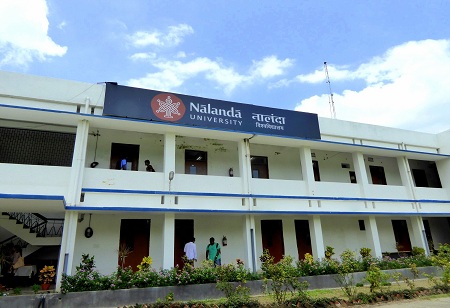Nalanda University to offer course on Bay of Bengal
 An academic course at Nalanda University (NU), which has carved out a role for itself in strengthening India's ties with East Asian countries, will now be available as an introduction to the geographical significance as well as history, culture, and art of the Bay of Bengal, an area of growing interest amid Prime Minister Narendra Modi's Act East Policy.
An academic course at Nalanda University (NU), which has carved out a role for itself in strengthening India's ties with East Asian countries, will now be available as an introduction to the geographical significance as well as history, culture, and art of the Bay of Bengal, an area of growing interest amid Prime Minister Narendra Modi's Act East Policy.
The university, which now operates from its sprawling campus in Rajgir, Bihar, offers ‘Bay of Bengal: An Introduction’ as a certificate course from this September via online classes. NU also has plans to make the course available offline in the future. The three-week course will include lectures from experts on navigation, fisheries, track-II policies and culture of countries involved with Bay of Bengal — India, Bhutan, Bangladesh, Nepal, Sri Lanka, Myanmar, Thailand, Indonesia, Malaysia, Singapore, China, USA, France, Germany, UK, Japan and Korea.
PM Modi had announced on August 30, 2018, during the Bay of Bengal Initiative for Multi-Sectoral Technical and Economic Cooperation (BIMSTEC) Summit’s opening session in Kathmandu, that the Centre for Bay of Bengal Studies would be established at NU. The centre was inaugurated on September 29 by Saurabh Kumar, Secretary (East), Ministry of External Affairs, along with NU Vice Chancellor Dr Sunaina Singh.
The first batch of the ‘Bay of Bengal: An Introduction’ course has 19 participants who are from India, Indonesia, Colombia and China. Most of them are researchers and academics.
The course content includes the study of trade and commerce in the Bay of Bengal, traditional and non-traditional security, major sea lanes, energy and other resources, blue economy, sustainable development, coastal tourism, geopolitical competition, migration and refugees, piracy, pollution, traditions, art and architecture, religions, food, festivals, music, dance, clothing, movies and overall economic and ecological relevance of the bay today.
Ruishu Wang, who has been doing her masters from Yunnan University of China, is one of 19 participants of the Bay of Bengal course. She said: “By attending the sessions, we have gained many enlightening opinions and had a more systematic and deeper understanding of the Bay of Bengal Studies.”
Vice Chancellor Singh said the Centre for Bay of Bengal Studies aims at contributing to research of the bay and offer insightful policy recommendations.
“With the world looking for solutions, more emphasis was placed on encouraging member-country collaboration through a more comprehensive analysis of new issues. CBS (Centre for Bay of Bengal Studies) will conduct research on new fields as well as the historical and spiritual connections in order to assure connectedness through links and increase understanding of the bay and the broader Indo-Pacific region,” she said.
The BIMSTEC’s fifth summit served as a good example of member countries’ dedication to enhancing regional prosperity while promoting connectivity and security, the vice chancellor added.
The Bay of Bengal is significant in terms of both India’s Act East Policy and the bay’s strategic orientations. India’s SAGAR (Security and Growth for All in the Region) vision and the Indo-Pacific Ocean Initiative have also made it important for a specialised multidisciplinary research centre about the bay to be set up.
Bangalore News
At the new NU campus, the focus is on how best to retain the cultural and architectural ethos of Nalanda Mahavihara, the 5th-12th century university that is considered one of the greatest centres of learning in ancient India.

.jpg)